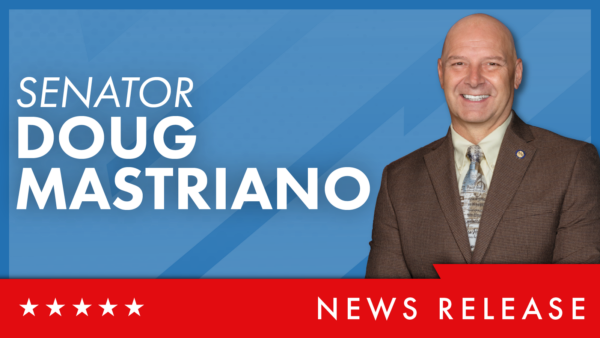
HARRISBURG – Two Pennsylvania women shared tear-filled stories and experts discussed the negative effects of the COVID-19 vaccine during a panel discussion held Friday at the state Capitol by Sen. Doug Mastriano (R-33).
“Pennsylvanians must have the fundamental right to make decisions about what goes into their own bodies,” said Mastriano, who sponsored Senate Bill 693, the Medical Freedom Act, which would prohibit state agencies and political subdivisions from mandating COVID-19 vaccinations. It also would protect Pennsylvanians against discrimination or the denial of services or medical care based on their refusal to accept a vaccination.
The panel began with testimony from Franklin County resident Janet Scholotter, a registered nurse who previously led an active lifestyle and traveled overseas. That all changed when she received the COVID-19 vaccine. She began experiencing excruciating headaches, lost her balance, heard a ringing in her ears, became hyper-sensitive to light and noise, and lost her ability to read or focus her thoughts.
“I’ve had a huge decline in my cognition,” Scholotter said, explaining how the vaccine led her to lose her certification as a nurse. “It’s a little frightening when you lose your mind when it used to be so sharp.”
“I had a plan for the future,” Scholotter continued, trying to hold back tears. “I wanted to travel more. I wanted to d omedical missionary trips around the world, but I couldn’t even renew my [registered nurse] license in December, because I can’t do the continuing education required. I wanted to someday spoil my future grandkids and I wanted to continue to go to my son’s basketball games. The life that I had planned and the life I did have is gone.”
Scholotter was followed by Alia Capodici, a 42-year-old Bucks County mother whose life was negatively affected when she had an adverse reaction to the COVID-19 vaccine.
“Before I received my second Pfizer vaccine, which turned our lives upside down, I was an active, happy single parent who worked full-time as a matchmaker,” Capodici said. “The first side effects happened immediately in the Walgreens. I started sweating. I was nauseous and dizzy.”
“Over the course of the next two months, the symptoms progressed to the point where I went from being a full-time employee and an active single mom, to a fully incapacitated adult unable to even care for myself or my four-year-old daughter,” Capodici said while crying. “My family feared that I was dying, and so did I. My daughter wondered what had happened to her mom.”
The next panel participant was cardiologist Peter McCullough, one of the most published cardiologists in America and a leading voice questioning the safety of the COVID-19 vaccine.
“This was the largest medical – the largest human – disaster in history,” McCullough said, describing the COVID-19 vaccination mandates.
McCullough outlined four broad categories of health damage caused by the COVID-19 vaccine, including cardiovascular and heart damage, neurologic or brain damage, blood clots and immune syndromes.
Dauphin County Coroner Graham Hetrick testified next about the shoddy system Pennsylvania used to categorize – and often wrongly – the cause of deaths during the pandemic. He spoke about a case where a baby died from roll-over asphyxiation, or suffocation, and state officials tried to categorize it as a COVID-19-related death.
“We can tell a lot about how we’re living by how we die,” Hetrick said, explaining the importance of accurate death records. “How we die can help us improve how we live.”
Attorney Thomas Renz – who has been counsel for many federal lawsuits challenging COVID-19 lockdowns, mask mandates and vaccine requirements – testified next about the importance of sharing facts with the public.
“I do believe the American public has the ability to draw conclusions based on facts that are solid, firm and real evidence,” Renz said. “This was the largest experiment on the human population in history.”
He also discussed the ways recent court decisions – including the partial repeal by the U.S. Supreme Court of the Roe v. Wade decision – impact issues related to bodily autonomy.
“Let me explain that in non-lawyer terms,” Renz said. “My body, my choice is more important than ‘grandma might catch a cold from you, so you have to vaccinate, you have to mask, you have to lockdown.’”
The final panel participant, philanthropist and former Silicon Valley high-tech executive Steve Kirsch, spoke about comparisons in health between the Amish, who tend to avoid vaccinations, and the general population, many of whom accept vaccines. He also discussed the need to hold accountable those authorities who misled the public during the pandemic.
“You’re not going to get accountability until people wake up,” Kirsch said.
“I’m grateful for all of our panel participants and the information they brought to the discussion,” Mastriano said. “I will continue to push for commonsense legislation to protect Pennsylvanians and fortify their medical freedom.”
Mastriano also sponsored legislation to prohibit the use and require the disclosure of mRNA in Pennsylvania’s food supply.
Constituents of the 33rd District can learn more about Mastriano by visiting his website at SenatorMastriano.com or following him on Facebook at Facebook.com/SenatorDougMastriano.
Media contact: Josh Herman
717-787-9603


